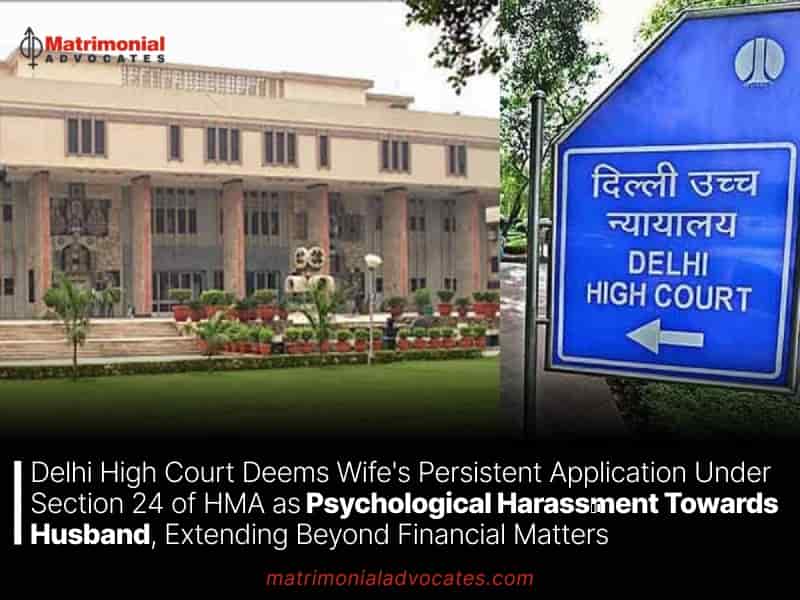
The Delhi High Court observed on Wednesday that despite the wife having received a payment of Rs. 1 crore and 80 lakhs from her husband, her continued pursuit of an application under Section 24 of the Hindu Marriage Act, 1955, indicates her intent to inflict mental harassment on him.
“Even if it is taken that respondent had failed to financially support the appellant during the period they lived together but despite having received payment of Rs.1 crores 80 lacs from respondent, the appellant had pressed her application under Section 24 of the Act in present proceedings, this shows her ill intention to mentally harass the appellant”, the Court opined.
The Court reviewed an Appeal filed by the appellant-wife under Section 19 of the Family Courts Act, 1984, challenging the judgment and decree issued by the Family Court on November 29, 2018. This decree granted the respondent’s petition for marriage dissolution under Section 13(1)(ia) of the Hindu Marriage Act, 1955.
Justices Suresh Kumar Kait and Neena Bansal Krishna, constituting the Division Bench, reiterated past judgments emphasizing the importance of trust and faith in marriage. They emphasized that making baseless accusations of extramarital affairs constitutes severe cruelty, leading to the breakdown of the marital relationship and undermining its very foundation.
The Bench observed that the appellant-wife had initially lodged a complaint under the Domestic Violence Act in Mumbai, which she later withdrew. Subsequently, she filed a similar petition against the respondent-husband in Delhi.
“The appellant in her cross-examination admitted that lump sum amount of Rs.2 crores was paid to her in the year 2015-2016 towards full and final settlement; and it is so evident from her statement recorded on 28.08.2015 in the proceedings under Domestic Violence Act, 2005, wherein, she stated that “I have settled my financial issues with my husband in pursuance of the settlement so I am withdrawing my interim maintenance application as not pressed,” the Court noted.
The Court cited the Supreme Court’s decision in Ravi Kumar Vs. Julmidevi (2010) 4 SCC 476, which clearly stated that “making reckless, false, and defamatory accusations against the husband and family members would damage their reputation in society” and constitute cruelty.
The marriage between the two parties took place on April 15, 1973, in New Delhi and was officially registered in Mumbai. Both individuals are Hindu American citizens with ‘Overseas Citizen of India’ status, and they have two children together.
After about 41 years of marriage, the respondent-husband filed for divorce from the appellant-wife. He claimed that there had been marital discord from the beginning, alleging that the appellant suddenly left for London early in their marriage. While he found employment in London and later in Chicago, USA, the respondent asserted that the appellant’s mother made their lives difficult during their time in Chicago. Additionally, the husband alleged that he and his family suffered mental and physical cruelty from the appellant. He argued that he had the right to live with the appellant, which she had deprived him of. He also mentioned that when he expressed his intention to cohabit with another person with whom he was having an extramarital affair, it further exacerbated the marital discord.
In contrast, the appellant-wife initiated a case under the Domestic Violence Act in Delhi and subsequently withdrew the case filed in Mumbai. She claimed to have sent numerous notices to the respondent through his counsel and filed a complaint in Mumbai. The appellant-wife denied the allegations of subjecting the respondent to mental and physical cruelty, arguing that the divorce petition filed by the respondent was in retaliation to her Domestic Violence Petition.
The Bench opined, “It is abundantly apparent that the appellant barely sees any good in respondent and by stretching multiple litigations against him and his sister, she has made it clear that there is no scope for their reunion. Moreover, despite living separately since the year 2013, she has never made an effort to reconcile the disputes.”
“In the light of above, the present appeal filed by the appellant against the judgment dated 29.11.2018 passed by the learned Family Court in HMA No. 1036/2014, is hereby dismissed. Consequently, the marriage of the parties stand dissolved under Section 13(1)(ia) of the Hindu Marriage Act, 1955. Decree sheet be prepared accordingly,” the Court ordered.





